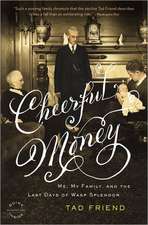Lost in Mongolia: Travels in Hollywood and Other Foreign Lands
Autor Tad Frienden Limba Engleză Paperback – 28 feb 2001
In Lost in Mongolia a collection of Tad Friend's most original, witty, and wide-ranging articles and essays from The New Yorker, Esquire, and Outside we are taken on a cultural tour of global proportions. Friend reports from the entertainment mecca of Hollywood on topics that range from the life and death of River Phoenix to the widespread plagiarism of movie ideas, to why celebrity profiles are always dreadful. He critiques the larger American culture with articles such as White Trash Nation, In Praise of Middlebrow, and a brief rumination on what it means when your girlfriend steals and wears your favorite shirt. Readers will also journey to foreign lands and American outposts, as Friend goes on the trail of the Marcos dynasty in the Philippines, is harassed in Morocco, and digs up buried treasure in Sun Valley.
Lost in Mongolia is a one-of-a-kind collection from a refreshingly candid and well-traveled journalist.
Preț: 116.96 lei
Nou
Puncte Express: 175
Preț estimativ în valută:
22.38€ • 23.93$ • 18.66£
22.38€ • 23.93$ • 18.66£
Carte disponibilă
Livrare economică 28 martie-11 aprilie
Preluare comenzi: 021 569.72.76
Specificații
ISBN-13: 9780812991550
ISBN-10: 0812991559
Pagini: 352
Dimensiuni: 140 x 216 x 23 mm
Greutate: 0.46 kg
Editura: ATRANDOM
ISBN-10: 0812991559
Pagini: 352
Dimensiuni: 140 x 216 x 23 mm
Greutate: 0.46 kg
Editura: ATRANDOM
Notă biografică
Tad Friend, a staff writer for The New Yorker, has had his articles published in The Best American Sports Writing and The Utne Reader's "Good Life" among other collections. He lives in New York City.
Extras
SITCOMS, SERIOUSLY
A Brady Bunch dream the other night. I was a Brady kid, in the sunken living room with Greg, Marcia, Peter, Jan, Bobby, and Cindy. We were fighting over the lead in the school play, or who could drive the car?something, anyway?when Mike Brady lolloped in. Our father wore bell-bottoms and a totally boss Qiana shirt and was grooving to a Walkman. Scattered laugh-track chuckles, perhaps at the anachronistic personal stereo. We all shouted, ?Hey, Dad, we?ve got a problem!? Mike bopped on.
kids: Hey, Dad!
mike: What?
kids: You can?t hear us. You?ve got a Walkman on!
mike: What?
kids: You can?t hear us. You?ve got a Walkman on!
mike: I?m sorry, kids, I can?t hear you?I?ve got a Walkman on!
The laugh track roared, and I awoke, lunging out of the sheets. It?s spooky to have a Brady dream, particularly one with a laugh track. Spookier still to have my sleep troubled by lame sitcom dialogue. Weren?t there some deep-seated childhood conflicts to work out?
Since then I?ve come to realize that the Brady dream did express a childhood conflict. This was clarified for me one recent evening when I sat on the beach with a dozen friends, enjoying the stars, the salty tang of the incoming tide, the moon glowing over the white carpet of water. Inspired, we took turns naming Brady Bunch episodes and recalled 107 before someone was stumped. They only made 116.
By my own estimate I have spent eleven thousand hours of my life, many of them the golden afternoons of youth, watching television sitcoms. They were often idiotic; I loved them anyway. Nowadays, as more or less a grown-up, I view sitcoms with a mixture of irony, nausea?many of them really do suck?and, still, deep affection. So, I?m conflicted.
Something new has happened to the generations born since The Goldbergs, the first sitcom, aired on CBS forty-four years ago. Those of us under forty-five grew up whelmed in sitcoms as minnows are whelmed in the sea, in thrall to a new mass art form, a transcontinental, transsocietal in-joke that reaches up to thirty million people every half hour. We are cradled in sitcoms, rocked in their warm lap, nursed from what Harlan Ellison calls ?the glass teat.?
?Who needed friends when we had chums like Dobie and Maynard, Margie and Mrs. Odettes, Walter Denton and Eddie Haskell?? writes Rick Mitz in The Great TV Sitcom Book. TV has come to understand its role as wet nurse: whereas in the early 1960s The Beverly Hillbillies?s Granny mistook a television for a newfangled washing machine, now the opening credits of The Simpsons, Dream On, and The Jackie Thomas Show present their characters hungrily eyeing the set.
The sitcom is television?s defining form. Although only one of the ten top-rated shows in 1952 was a sitcom and three of ten in 1972 were sitcoms, seven of the top ten in 1992 were sitcoms. Sitcoms are on the networks during prime time, on local channels early in the morning and late at night, on Turner Broadcasting, Christian Broadcasting, the Family Channel, and Nick at Nite. If you have cable in New York City, you can (try to) watch 32 1/2 hours of sitcoms a day. Sitcoms have become our most pervasive, powerful, and cherished form of media output. They flow into every corner of our lives.
And what have we learned from electronic Mom? Not much, say ?adults,? who denounce sitcoms for turning us into Chance the Gardener. As long ago as 1961, FCC chairman Newt Minnow declared sitcoms ?formula comedies about totally unbelievable families?; more recently Steven Spielberg, of all people, called Cheers, Roseanne, and The Cosby Show part of ?a wasteland of homogenized milk.? And certainly when I ponder how contentedly I watched Hogan?s Heroes?s Sergeant Schultz shake his strudel-fed face and protest for the thousandth time, ?I know nuth-ing,? the suspicion occurs that he wasn?t kidding.
The dismissive adult view of sitcoms is loudest espoused by highbrow cultural guardians like Neil Postman and the late Allan Bloom, who want to build a fire wall around the popular art forms they claim will destroy us with their damnable intent to cause pleasure and laughter. The adult view says that sitcoms fail to meet traditional highbrow standards: great art should kidnap its auditors, knock them on the head and drag them through the cobbled streets, shake the snowy globe of the world and let the flakes fall where they may.
Sitcoms don?t have this effect. But so what? Those of us who?ve swum in the cathode sea since birth experience sitcoms in a new way and expect them to serve a different purpose from that of Madame Bovary and Schubert?s Eighth Symphony?we expect them to show us our place in the world, not disturb it.
A Brady Bunch dream the other night. I was a Brady kid, in the sunken living room with Greg, Marcia, Peter, Jan, Bobby, and Cindy. We were fighting over the lead in the school play, or who could drive the car?something, anyway?when Mike Brady lolloped in. Our father wore bell-bottoms and a totally boss Qiana shirt and was grooving to a Walkman. Scattered laugh-track chuckles, perhaps at the anachronistic personal stereo. We all shouted, ?Hey, Dad, we?ve got a problem!? Mike bopped on.
kids: Hey, Dad!
mike: What?
kids: You can?t hear us. You?ve got a Walkman on!
mike: What?
kids: You can?t hear us. You?ve got a Walkman on!
mike: I?m sorry, kids, I can?t hear you?I?ve got a Walkman on!
The laugh track roared, and I awoke, lunging out of the sheets. It?s spooky to have a Brady dream, particularly one with a laugh track. Spookier still to have my sleep troubled by lame sitcom dialogue. Weren?t there some deep-seated childhood conflicts to work out?
Since then I?ve come to realize that the Brady dream did express a childhood conflict. This was clarified for me one recent evening when I sat on the beach with a dozen friends, enjoying the stars, the salty tang of the incoming tide, the moon glowing over the white carpet of water. Inspired, we took turns naming Brady Bunch episodes and recalled 107 before someone was stumped. They only made 116.
By my own estimate I have spent eleven thousand hours of my life, many of them the golden afternoons of youth, watching television sitcoms. They were often idiotic; I loved them anyway. Nowadays, as more or less a grown-up, I view sitcoms with a mixture of irony, nausea?many of them really do suck?and, still, deep affection. So, I?m conflicted.
Something new has happened to the generations born since The Goldbergs, the first sitcom, aired on CBS forty-four years ago. Those of us under forty-five grew up whelmed in sitcoms as minnows are whelmed in the sea, in thrall to a new mass art form, a transcontinental, transsocietal in-joke that reaches up to thirty million people every half hour. We are cradled in sitcoms, rocked in their warm lap, nursed from what Harlan Ellison calls ?the glass teat.?
?Who needed friends when we had chums like Dobie and Maynard, Margie and Mrs. Odettes, Walter Denton and Eddie Haskell?? writes Rick Mitz in The Great TV Sitcom Book. TV has come to understand its role as wet nurse: whereas in the early 1960s The Beverly Hillbillies?s Granny mistook a television for a newfangled washing machine, now the opening credits of The Simpsons, Dream On, and The Jackie Thomas Show present their characters hungrily eyeing the set.
The sitcom is television?s defining form. Although only one of the ten top-rated shows in 1952 was a sitcom and three of ten in 1972 were sitcoms, seven of the top ten in 1992 were sitcoms. Sitcoms are on the networks during prime time, on local channels early in the morning and late at night, on Turner Broadcasting, Christian Broadcasting, the Family Channel, and Nick at Nite. If you have cable in New York City, you can (try to) watch 32 1/2 hours of sitcoms a day. Sitcoms have become our most pervasive, powerful, and cherished form of media output. They flow into every corner of our lives.
And what have we learned from electronic Mom? Not much, say ?adults,? who denounce sitcoms for turning us into Chance the Gardener. As long ago as 1961, FCC chairman Newt Minnow declared sitcoms ?formula comedies about totally unbelievable families?; more recently Steven Spielberg, of all people, called Cheers, Roseanne, and The Cosby Show part of ?a wasteland of homogenized milk.? And certainly when I ponder how contentedly I watched Hogan?s Heroes?s Sergeant Schultz shake his strudel-fed face and protest for the thousandth time, ?I know nuth-ing,? the suspicion occurs that he wasn?t kidding.
The dismissive adult view of sitcoms is loudest espoused by highbrow cultural guardians like Neil Postman and the late Allan Bloom, who want to build a fire wall around the popular art forms they claim will destroy us with their damnable intent to cause pleasure and laughter. The adult view says that sitcoms fail to meet traditional highbrow standards: great art should kidnap its auditors, knock them on the head and drag them through the cobbled streets, shake the snowy globe of the world and let the flakes fall where they may.
Sitcoms don?t have this effect. But so what? Those of us who?ve swum in the cathode sea since birth experience sitcoms in a new way and expect them to serve a different purpose from that of Madame Bovary and Schubert?s Eighth Symphony?we expect them to show us our place in the world, not disturb it.
Recenzii
"No journalism about the entertainment business gives me more pleasure than Tad Friend's. He is unvaryingly smart, fun, funny and fearless, and a terrific reporter to boot."
--Kurt Andersen, author of Turn of the Century
"Tad Friend is the finest writer who has never done stand-up comedy working today. Reading these thoughtful, surprising essays is pure pleasure."
--Steve Martin, author of Shopgirl and Pure Drivel
--Kurt Andersen, author of Turn of the Century
"Tad Friend is the finest writer who has never done stand-up comedy working today. Reading these thoughtful, surprising essays is pure pleasure."
--Steve Martin, author of Shopgirl and Pure Drivel






